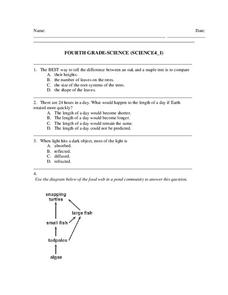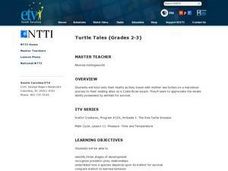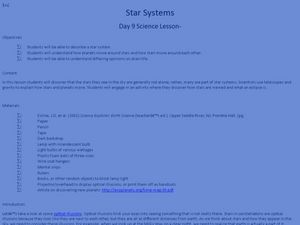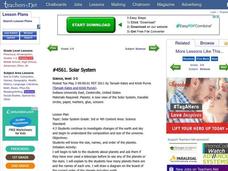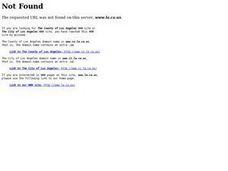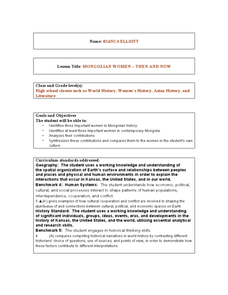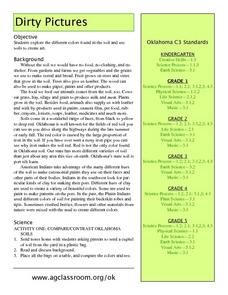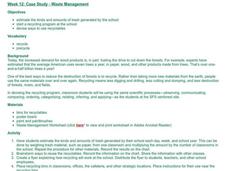Curated OER
Lesson Ten: Direction
Students explore the concept of relative location. In this map lesson, students read I Hate English by Ellen Levine and consider how maps and globes help people to familiarize themselves with an area.
Curated OER
Plotting Sunspot Activity
Students explore how to graph sunspots using a solar graph. In this sunspots lesson students investigate sunspots and complete and evaluation worksheet.
Curated OER
Weather Report Chart
Students complete a weather report chart after studying weather patterns for a period of time. In this weather report lesson, students measure temperature, precipitation, cloud cover, wind speed, and wind direction for a month. Students...
Curated OER
Baleen Whales vs. Toothed Whales
Second graders review mammal characteristics and study two types of whales. In this mammal study lesson, 2nd graders discuss mammals and define their five characteristics. Students complete a whale worksheet and define differences...
Curated OER
Fourth Grade Science
In this science worksheet, 4th graders complete multiple choice questions about day lengths, light and dark, food, recycling, and more. Students complete 25 questions.
Curated OER
Turtle Tales
Pupils watch videos and fill out worksheets about the turtles and their journey to the Costa Rican beach. In this turtles lesson plan, students learn and discuss survival, predator and prey, and stages of development.
Curated OER
Save A Reef!
Students identify the major threats to coral reefs and the ways that they benefit from humans. In this coral reef conservation activity students create a public education program on coral reefs.
Curated OER
Out of the Dust: Figurative Language
Learners find examples of figurative language in "First Rain" in Out of the Dust. In this Out of the Dust lesson, students takes notes on various type of figurative language and identify examples of each type in the poem.
Curated OER
Star Systems
Students study a star system and see how the planets move around stars. In this star system activity students complete an activity and see what an eclipse is.
Curated OER
Solar System
Students study space. In this solar system lesson, students discover the correct order of the planets and create a diagram showing this knowledge. They listen to the book A New View of the Solar System and then work in groups on their...
Curated OER
Probes, Exploration & Application
Students explore how a surface can be described without seeing it.
Curated OER
MONGOLIAN WOMEN - THEN AND NOW
Pupils are introduced to the history of Mongolia. This is a general overview before going into the real detail of the lesson. The main focus is upon the development of the women of Mongolia and the major contributions they have made.
Curated OER
Finding Jupiter's Moons
Students explore Jupiter's Moons. They calculate and predict the location of Jupiter's 4 large moons. In addition, they draw Jupiter with its moons correctly shown for the time of the observation.
Curated OER
A DISAPPEARING ACT Astronomy: Do Stars Always Shine?
Students observe why stars are not visible during the day with a classroom demonstration using an index card punched with holes.
Curated OER
Streamflow
High schoolers discuss the topic of streamflow and how it occurs. They take measurements and analyze them. They interpret data and create their own charts and graphs.
Curated OER
Life in a Cup
Third graders make and maintain a mini terrarium. They keep a daily journal of what happens in their terrarium and record daily observations and measurements.
Curated OER
Where Is That Place?
Students determine the difference between a country, state, and a city while recording the weather conditions for their school in Nebraska. They examine weather for another school in the state while practicing using weather equipment to...
Curated OER
Is There Really Life on Mars?
Young scholars examine the work of scientists and determine how they test their theories.
Curated OER
It's So Sticky Outside That...
Learners examine the phases of the water cycle and water's different forms it can have. They work in groups to create pantomimes to illustrate the water cycle to their classmates.
Curated OER
Everybody Needs a Rock
Second graders examine science non-fiction books in the 500 section of the media center. They listen to Byrd Baylor's, Everybody Needs a Rock, and write a sentence that tells why everyone does need a rock. They illustrate the sentence.
Curated OER
The Undiscovered Planet
Students find a planetary object using star fields. In this investigative instructional activity students determine the distance to an object using trigonometric parallax.
Curated OER
Measuring the Diameter of Our Star
Young scholars conduct an experiment to measure the diameter of the sun. In this astronomy lesson, students construct a simple equipment to collect scientific data. They calculate the sun's diameter using a given formula.
Curated OER
Dirty Pictures
Students investigate how food, clothing and shelter come from soil after they examine soil from their own backyards. They map soils on the color wheel before making glue and soil pictures and tie-dying T-shirts in red soil.
Curated OER
Waste Management
Students set up a recycling program in their school. They first estimate the kinds and amount of trash generated and brainstorm ways to reuse the recyclables and create flyers explaining how their program will work at the school.






